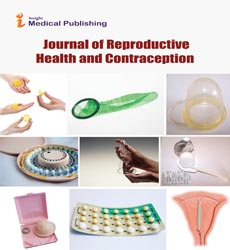PAPP-A and AFP are Connected to the Placental Abruption
Charles Goodle
Charles Goodle*
University of Oxford, John Radcliffe, Headington, Oxford, UK
- *Corresponding Author:
- Charles Goodle
University of Oxford
University of Oxford, John Radcliffe,Headington, Oxford, UK
E-mail: cc62@cornell.edu
Received Date: October 09, 2021; Accepted Date: October 23, 2021; Published Date: October 30,2021
Citation: Goodle C (2021) PAPP-A and AFP are Connected to Placental Abruption. J Contracept Stud Vol 6 No.2:7.
Due The abruption placentae, or premature separation of a normally implanted placenta, affects up to 1% of pregnancies and is a substantial contribution to perinatal mortality and morbidity. Epidemiological evidence suggests that the incidence is growing. The dependence on clinical signs, which can show late and be nonspecific, limits early detection of abruption.
Recent research has found a link betweenThere's a link between placental abruption, maternal features, and aneuploidy screening serum analyses. The first and second trimesters are the most important. Using the findings of the Prenatal screening in California is associated to live birth and The authors discovered a strong link between maternal age greater than 34 years and low birth weight in hospital discharge records pregnancy-associated plasma protein-A in the mother's serum (PAPP-A) and high levels of alpha-fetoprotein (AFP) abruption of the placenta. The degree of connection appeared to be significant. AFP levels that are high are associated with an increased risk of cancer. The study's strong points take into account the high sample size of over 1000 women abruption, as well as the elimination of a significant possible confounder, Although the study's use of linked birth certificate data may be viewed as a drawback, this dataset looks to be more robust due to its linkage to hospital records and has been confirmed by other studies. The mechanism behind the link between maternal age and placental abruption was not completely investigated by the researchers. Another restriction is the possibility of ascertainment bias, which applies to all studies on the subject of placental abruption. Many causes of unexplained vaginal bleeding could be defined as abruption and reported as such in the discharge record because placental abruption is a clinical diagnosis.
Recent research has found a link between indices of aberrant placentation in the first trimester, such as low levels of PAPP-A, placental growth factors, and other antigenic markers, and poor pregnancy outcomes. PAPP-A levels that are low in the first trimester have been linked to aberrant placental morphometric. When compared to a comparison group with normal PAPP-A levels and straightforward pregnancies, the terminal villi of pregnancies with low-PAPA and foetal growth limitation were considerably smaller. Furthermore, there were substantial changes in firsttrimester PAPP-A, placental growth factor (PlGF), and adipose growth factor (Adis) levels.
The obvious next question is whether the link discovered between these markers and abruption is sufficiently strong to propose a formal abruption screening programme The fact that these serum indicators are already on the market and can be used It could be used to screen for aneuploidy and neural tube defects make it simple to add abruption screening as a secondary screening goal. Despite the allure of this idea, the modesty of it is a deterrent. Many studies seeking to improve screening accuracy have reported high accuracy to screen for preeclampsia (a more serious condition), utilise similar analytes. Placental abruption is the most common pregnancy problem. Because a big section of the population may not have these serum markers, abruption screening may be difficult. The current study is the first step in identifying women who are at high risk of placental abruption. This closer surveillance of women may be beneficial. If the findings are positive, it will be laid out if it can be validated by large prospective studies. Future trials evaluating potential therapies to prevent placental abruption will be built on this foundation. PAPP-A levels were not linked to AFP levels in women with low PAPP-A.
Open Access Journals
- Aquaculture & Veterinary Science
- Chemistry & Chemical Sciences
- Clinical Sciences
- Engineering
- General Science
- Genetics & Molecular Biology
- Health Care & Nursing
- Immunology & Microbiology
- Materials Science
- Mathematics & Physics
- Medical Sciences
- Neurology & Psychiatry
- Oncology & Cancer Science
- Pharmaceutical Sciences
